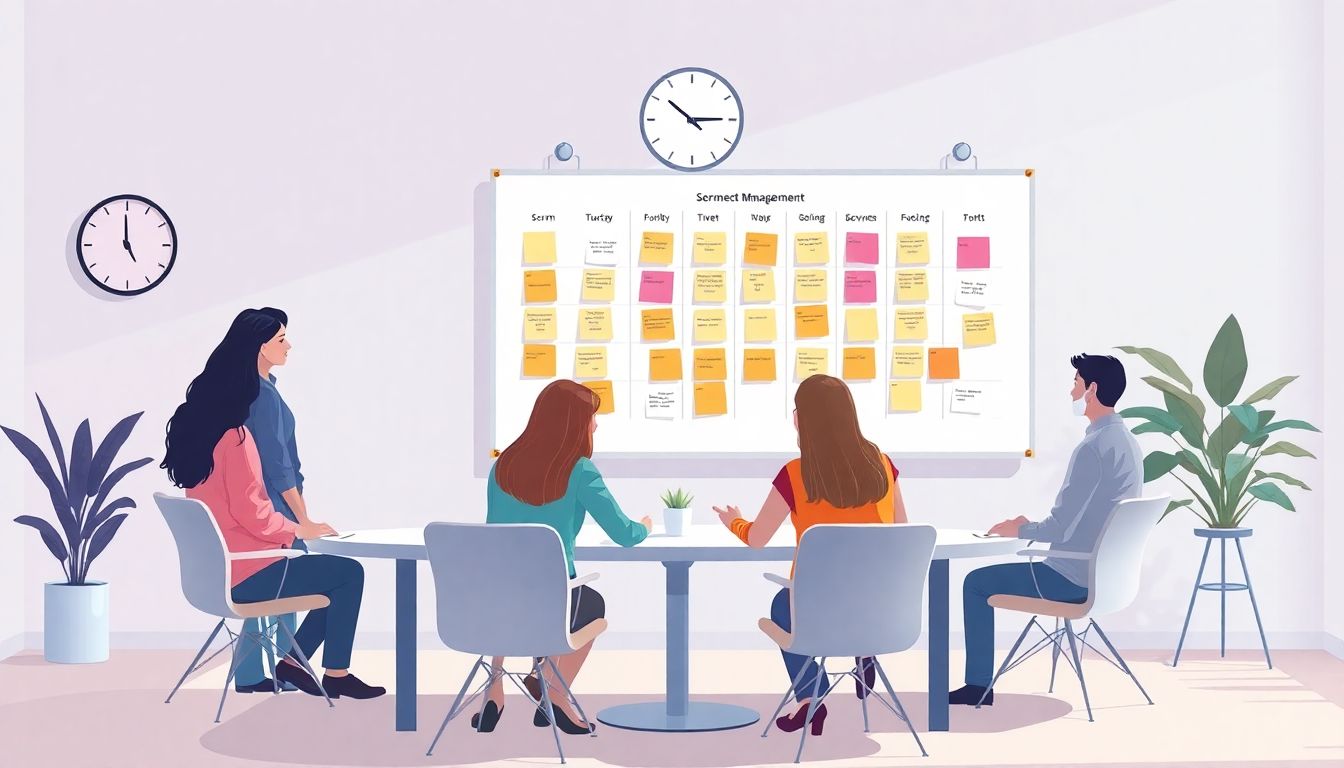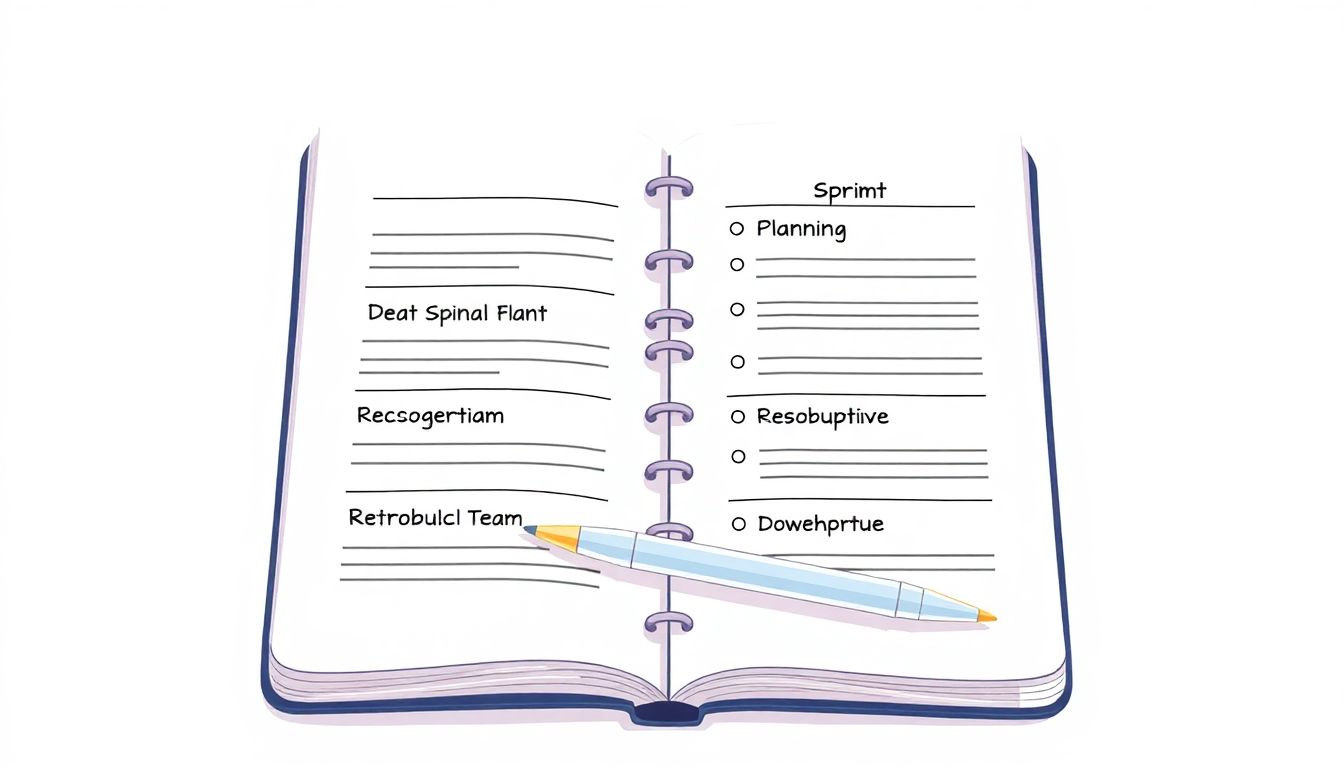If you’re diving into the world of Scrum methodologies, you might be feeling a bit overwhelmed. Juggling sprints, daily stand-ups, and product backlogs can make anyone’s head spin! You’re not alone in this; many Scrum Masters and team members find it challenging to keep things organized while maintaining effective communication.
Stick around, and I promise you’ll discover an array of ChatGPT prompts designed to streamline your Scrum experience. These prompts will help enhance your meetings, clarify your product backlog, and encourage better team collaboration, making your journey through Scrum a whole lot smoother.
We’ll explore everything from daily updates to retrospective meetings, offering practical tips and examples along the way. Get ready to supercharge your Scrum practices with the help of ChatGPT!
Key Takeaways
- Scrum can be complex; using ChatGPT prompts simplifies organization and communication.
- Effective prompts help manage sprints, product backlogs, and team collaboration.
- Understanding roles like Scrum Master and Product Owner is crucial for Scrum success.
- Daily scrum meetings are more effective with engaging questions and structured agendas.
- Retrospectives are essential for improvement; utilize prompts to reflect and plan actions.
- Collaboration activities and icebreakers can enhance team relationships within Scrum.

Top ChatGPT Prompts for Scrum Methodologies
Using ChatGPT in Scrum can significantly improve efficiency and communication within your team.
Here are some effective prompts you can use:
- “Generate a list of key metrics to track during a sprint for a software development team.”
- “Outline a plan for a Scrum implementation in a small agency, including roles and responsibilities.”
- “Create a weekly retrospective template that encourages honest feedback from team members.”
- “Suggest ways to maintain team motivation during long-term projects using Scrum.”
These prompts can help streamline your Scrum processes and ensure your team stays focused on delivering value.
Understanding Scrum Methodologies: Key Concepts
Scrum is a popular Agile framework that facilitates team collaboration on complex projects.
To grasp Scrum, it’s essential to know its core components, such as the roles involved: Scrum Master, Product Owner, and Development Team.
Each role has distinct responsibilities. For example, the Scrum Master ensures the team adheres to Scrum practices, while the Product Owner prioritizes the product backlog.
Key artifacts in Scrum include the Product Backlog, Sprint Backlog, and Increment. Together, they help teams prioritize work and track progress effectively.
To understand how to utilize Scrum effectively, consider this prompt: “Explain the roles of Scrum Master, Product Owner, and Development Team in detail.”
Using ChatGPT to Design Scrum Frameworks
Designing a Scrum framework customized to your team’s needs can enhance productivity and engagement.
ChatGPT can assist you in brainstorming tailored approaches based on your unique project requirements.
Here are some prompts you might find useful:
- “Help design a Scrum framework for a remote development team.”
- “Outline a weekly Scrum schedule that accommodates team members in different time zones.”
- “Generate guidelines for integrating design thinking into the Scrum process.”
These prompts empower you to create a more effective framework that suits your context.
Daily Scrum Meeting Prompts for Effective Updates
Daily scrum meetings are crucial for keeping everyone aligned and accountable.
Using ChatGPT can help you formulate engaging questions that drive productive discussions.
Try these prompts for your daily stand-ups:
- “Create a list of three questions everyone should answer in the daily Scrum meeting.”
- “Suggest activities to make daily stand-ups more interactive and engaging.”
- “Draft an agenda for discussing blockers in the daily Scrum meeting.”
These prompts can lead to more valuable updates, ensuring your team effectively communicates challenges and progress.

Prompts for Creating and Managing Product Backlogs
Managing a product backlog is essential for a successful Scrum process.
It helps prioritize tasks and ensures that the team delivers maximum value.
Use these prompts to streamline your backlog creation and management:
- “Create a detailed template for writing clear user stories for the product backlog.”
- “Generate criteria for prioritizing items in the product backlog based on business value.”
- “List common mistakes to avoid when refining the product backlog.”
- “Suggest tools and techniques for facilitating product backlog refinements.”
These prompts can enhance your backlog management practices and improve team focus.
Facilitating Sprint Planning with ChatGPT Prompts
Sprint planning is a key step where the team decides what to accomplish in the upcoming sprint.
Effective sprint planning sets the tone for a successful work cycle.
Try these prompts to help plan your sprints effectively:
- “Draft a checklist to ensure all aspects of sprint planning are covered.”
- “Create a template for documenting sprint goals and commitments.”
- “Generate a list of questions the team should discuss during sprint planning.”
- “Outline common pitfalls in sprint planning and how to avoid them.”
Using these prompts will help ensure your sprint planning sessions are focused and productive.
Encouraging Team Collaboration Through ChatGPT Prompts
Collaboration is at the heart of Scrum, and fostering it can lead to more innovative solutions.
Here are some prompts aimed at enhancing team collaboration:
- “Suggest icebreaker activities for building team rapport during Scrum meetings.”
- “Generate conversation starters that can help the team discuss their challenges openly.”
- “Create guidelines for constructive feedback during team discussions.”
- “List methods to recognize and celebrate team achievements regularly.”
These prompts can help create a positive team environment, promoting communication and collaboration.
Retrospective Prompts to Improve Future Sprints
Retrospectives are crucial for continuous improvement in Scrum teams.
They provide an opportunity to reflect on what went well and what can be improved.
Consider these prompts to make your retrospectives more effective:
- “Draft a series of questions to guide the team in reflecting on the past sprint.”
- “Create a template for documenting actionable insights and follow-up tasks from retrospectives.”
- “Generate a list of creative activities to conduct during a sprint retrospective.”
- “Suggest methods for effectively tracking issues identified in retrospectives over time.”
Using these prompts can help motivate the team to take actionable steps for future sprints.

Best Practices for Using ChatGPT in Scrum Teams
To make the most out of ChatGPT in your Scrum processes, establishing best practices is key.
Ensure clear and effective communication when using ChatGPT prompts to avoid misunderstandings.
Try these prompts for guidance:
- “List best practices for integrating ChatGPT into daily Scrum activities.”
- “Suggest guidelines for crafting effective prompts for Scrum management.”
- “Outline practical strategies for incorporating ChatGPT feedback into sprint reviews.”
- “Generate tips for maintaining team engagement while using AI tools in Scrum.”
Implementing these practices can lead to a more productive Scrum environment for your team.
Common Challenges in Scrum and ChatGPT Solutions
Scrum teams often encounter challenges, from communication breakdowns to unclear role definitions.
ChatGPT can help identify and address these issues effectively.
Here are some prompts to navigate common struggles:
- “Identify typical challenges Scrum teams face during sprint cycles.”
- “Suggest practical solutions using ChatGPT for resolving team conflicts.”
- “Generate a troubleshooting guide for common Scrum misunderstandings.”
- “Outline strategies for improving team motivation when facing project roadblocks.”
By leveraging these solutions, you can enhance your Scrum team’s performance and cohesion.
Examples of ChatGPT Prompts Used by Scrum Masters
Scrum masters can greatly benefit from specific prompts designed to address everyday Scrum activities.
Here are some practical examples of prompts that have been successfully used:
- “Create a weekly agenda template for Scrum meetings.”
- “Draft a survey to gather team feedback after each sprint.”
- “List activities to engage remote team members during retrospectives.”
- “Generate questions to facilitate productive discussions during sprint planning.”
Using these prompts can make Scrum management smoother and more effective for Scrum masters and their teams.
FAQs
Scrum methodologies prioritize iterative development, strong team collaboration, and continuous improvement. Key principles include incrementally delivering valuable software, evident roles (Scrum Master, Product Owner, Team), and regular inspect-and-adapt cycles through sprints and retrospectives.
ChatGPT can help by generating prompts for discussion, creating task lists based on user stories, and facilitating prioritization of backlog items. This streamlines the planning process and enhances team engagement and focus on deliverables.
Effective prompts for daily Scrum meetings include questions like: What did you accomplish yesterday? What are you working on today? Are there any impediments? These help ensure clear communication and keep the team aligned on goals.
Common challenges include lack of communication, unclear roles, and backlog management issues. ChatGPT can provide tailored suggestions, improve team dynamics, and facilitate discussions to resolve conflicts and enhance productivity.
